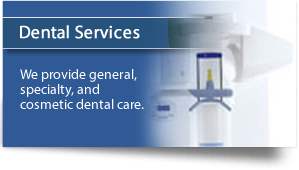Introduction to Pediatrics
 The first “regular” dental visit should be just after your child’s third birthday. The first dental visit is usually short and involves very little treatment. We may ask the parent to sit in the dental chair and hold their child during the examination. The parent may also be asked to wait in the reception area during part of the visit so that a relationship can be built between your child and your dentist.
The first “regular” dental visit should be just after your child’s third birthday. The first dental visit is usually short and involves very little treatment. We may ask the parent to sit in the dental chair and hold their child during the examination. The parent may also be asked to wait in the reception area during part of the visit so that a relationship can be built between your child and your dentist.
We will gently examine your child’s teeth and gums. X-rays may be taken (to reveal decay and check on the progress of your child’s permanent teeth under the gums). We may clean your child’s teeth and apply topical fluoride to help protect the teeth against decay. We will make sure your child is receiving adequate fluoride at home. Most important of all, we will review with you how to clean and care for your child’s teeth.
Your Child’s First Visit tips:
- Read books with them about going to the dentist.
- Review with them what the dentist will be doing at the time of the first visit.
- Speak positively about your own dental experiences.
During your child’s first visit the dentist will:
- Examine your mouth, teeth and gums.
- Evaluate adverse habits like thumb sucking.
- Check to see if you need Fluoride.
- Teach you about cleaning your teeth and gums.
- Suggest a schedule for regular dental visits.
The first baby teeth that come into the mouth are the two bottom front teeth. You will notice this when your baby is about 6-8 months old. Next to follow will be the 4 upper front teeth and the remainder of your baby’s teeth will appear periodically. They will usually appear in pairs along the sides of the jaw until the child is about 2 1/2 years old. At around 2 1/2 years old your child should have all 20 teeth. Between the ages of 5 and 6 the first permanent teeth will begin to erupt. Some of the permanent teeth replace baby teeth and some don’t. Don’t worry if some teeth are a few months early or late as all children are different. Baby teeth are important as they not only hold space for permanent teeth but they are important for chewing, biting, speech and appearance. For this reason it is important to maintain a healthy diet and daily hygiene.

